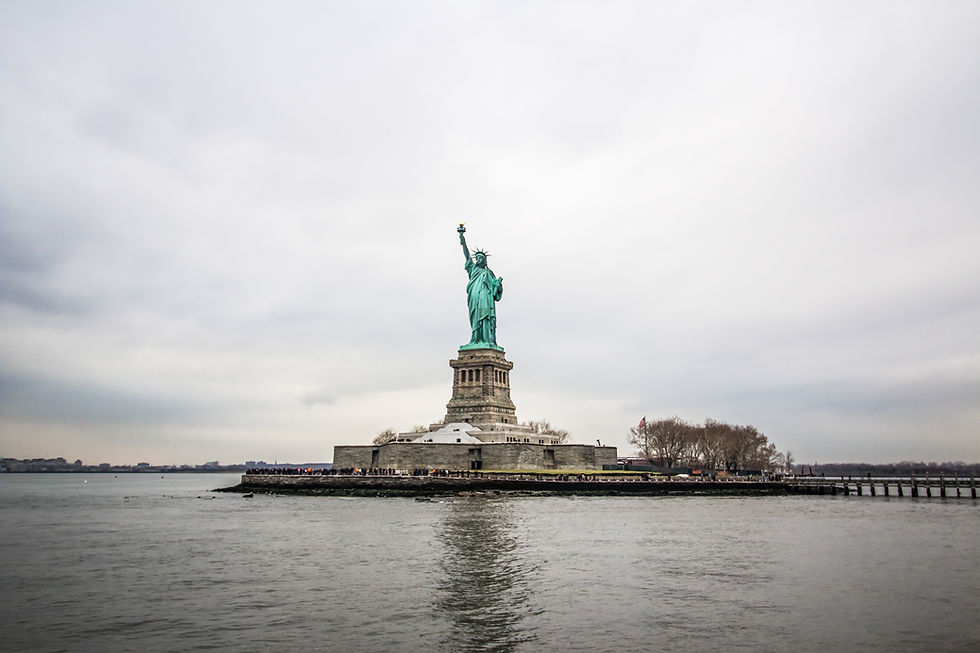OLIVER: Drug War helps create outsized incarceration rate
- Kelsey Lyon
- Apr 20, 2023
- 4 min read
ATLANTA - The land of the free? Only for those who overlook the fallout of a war that’s been waged since 1970 – the War on Drugs.
“The reason Libertarians want to end the Drug War is not just so we can smoke weed,” says Chase Oliver, Libertarian presidential hopeful. “We want to end the Drug War because we have a massive incarceration problem, and much of that problem is directly related to the Drug War.”
The United States locks up 1.9 million people. That’s 565 per 100,000 residents – the world’s highest rate, according to a Prison Policy Initiative report, Mass Incarceration. Add in the number on probation and parole, and the U.S. justice system controls 5.5 million people – the population of Los Angeles and Phoenix combined.
Many are incarcerated for drug offenses, mostly possession. On any given day, about 353,000 people are incarcerated for drug offenses, according to Prison Policy Initiative. The breakdown:
132,000 in state prisons
69,000 in Federal Bureau of Prisons facilities,
21,000 in U.S. Marshals Service facilities
129,000 in local jails (109,000 of those not convicted)
1,600 in youth detention facilities
270 in Indian country jails
55 in military detention
Police made more than 700,000 arrests for marijuana in 2018 – that’s 43 percent of all drug arrests and more than arrests for all violent crimes combined, according to the FBI reports cited by the ACLU in A Tale of Two Countries: Racially Targeted Arrests in the Era of Marijuana Reform.

decriminalization in a growing number of states, according to the ACLU report.
Pew Research Center breaks down drug arrests in 2018 in its report, Four in Ten U.S. Drug Arrests in 2018 Were for Marijuana Offenses:
40 percent arrested for marijuana (92 percent for possession)
25 percent for heroin, cocaine, or derivatives
6 percent for synthetic or manufactured drugs
29 percent for other
Too many people return to incarceration after being freed. Nationally, the Prison Policy report shows that 19 percent of people in jail are on violation of probation or parole, and 1 in 4 people in state prisons are incarcerated for supervision violations.
Once released, those in jail or prison for drug offenses may face what is called collateral consequences – restrictions on voting, housing, education, employment, and separation from families, the ACLU reports. Some states automatically suspend driver’s licenses or deny SNAP benefits; students may lose federal student aid. It harms families when 1 in 12 children grows up with a parent who’s been incarcerated.
Rates of arrest and incarceration by race are wildly out of sync with marijuana usage. Blacks and whites report marijuana usage rates that are a statistical tie, yet police are 3.64 times more likely to arrest black for possession over whites, the ACLU report says.
The ACLU report considers the changing legal landscape, given that some states have legalized recreational cannabis use and others have decriminalized it. It warns against a system of fines and fees will the disparity of punishment on minorities and the poor, effectively bringing back debtors’ prisons.
“While fees should never be implemented, if fines must be, they should be proportionate, both in terms of individual income and severity of the offense, and they should impose an equitable burden on people regardless of income level,” the ACLU report says.
What’s the way out? Oliver notes that marijuana – long called a gateway drug to other drugs – may do the opposite: States with legalized cannabis are seeing opioid addiction rates fall.
Oliver says that as president, he’d end the War on Drugs, focusing instead on addiction treatment, as Portugal did in the 1990s in its fight against rampant heroin addiction.
“Portugal had two options: They could crack down as we’ve done, create a drug war and attack their own citizens and jail them and create further trauma and create a prison cycle as we have in this country. They actually took the other path: Portugal decriminalized all drugs,” Oliver says.
That empathetic solution worked because it addresses the problem, he adds.
“They made it so that if you’re an addict, you don’t fear having to tell people you’re an addict because you think you’re going to go to jail. You’re allowed to go out and actually get the help you need, which actually is the compassionate way we need to treat addiction because ultimately this is an addiction crisis.”
Oliver, 38, announced his bid to become the presidential nominee of the Libertarian Party earlier this month. Oliver is the first openly gay Senate candidate in Georgia, where he garnered over 80,000 votes in 2022, forcing a runoff between his Republican and Democratic opponents.
Oliver’s national attention grew following his debate with incumbent Sen. Raphael Warnock and an empty podium set aside for opponent Herschel Walker. Broadcast coverage includes PBS, CNN, Fox Business, and CSPAN. Print coverage includes The New York Times, The Washington Post, Bloomberg, and Rolling Stone, which labels him the “Most Influential Libertarian.”
Oliver is available for media interviews, university journalism, and communications students.
To learn more about Chase Oliver, donate, or volunteer, please visit votechaseoliver.com.
###
SOURCES
A Tale of Two Countries: Racially Targeted Arrests in the Era of Marijuana Reform, ACLU Research Report https://www.aclu.org/gallery/marijuana-arrests-numbers
Four in Ten U.S. Drug Arrests in 2018 Were for Marijuana Offenses – Mostly Possession, Pew Research Center https://www.pewresearch.org/fact-tank/2020/01/22/four-in-ten-u-s-drug-arrests-in-2018-were-for-marijuana-offenses-mostly-possession/Mass Incarceration: The Whole Pie 2023, Prison Policy Initiative, Wendy Sayer, Peter Wagner




Comments